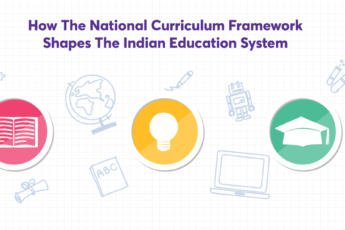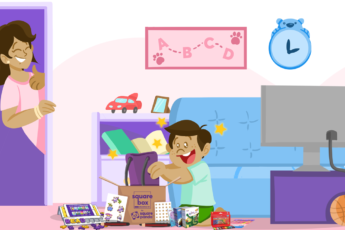Does early education make a difference?
If you’re a parent, you’re probably very familiar with that phrase: “children are like sponges”. It refers to how children absorb facts, language, and life skills at a remarkable rate during their earliest years of development. That’s because these years are among the most critical in shaping who they will become and what they will learn. And while kids discover many of the things they need to know from their families and communities, early childhood education is an integral part of this process.
Many people refer to early childhood education as preschool. But today, the term means so much more. It is a time when children begin to acquire essential social, emotional and cognitive skills. This will serve them well in later years and help lay the foundation for success in school and beyond.
Besides learning in the classroom, young children’s earliest experiences directly impact the development of their brains and their abilities far into the future. Research has shown that 90% of brain development happens before age 5. Early childhood education provides opportunities for active exploration and helps children meet essential developmental goals while encouraging curiosity and creativity. Here are some of the benefits of early childhood education:

👉 Socialization
Socialization happens when we learn how to live in harmony with other people in our communities — when we learn how to share, take turns, and respect each other’s boundaries. And for many kids, preschool is the first place they can practice those skills!
Children at this age are often eager to make friends and connect with others, but they haven’t yet learned how to do so appropriately. They may still have trouble sharing toys or taking turns on the swing set. Young kids can experiment with interactions by participating in activities like cooperative play and music time with their peers. They can do it under the guidance of trained teachers who can show them how to communicate effectively in a group.
👉 Better Academic Performance
A study found that young children who attended early childhood education programs were more likely to score well on reading and math tests than those who didn’t attend these programs.
One of the main reasons for this is that children who attend preschool are exposed to structured learning and playtime activities, which help prepare them for kindergarten and first grade. A child who has not mastered basic skills like the alphabet, numbers, and shapes will find it difficult to progress further in school. They may be at risk of falling behind their classmates or having to repeat a grade level. If a child is too far behind, they may eventually drop out of school. But if you give your children a head start when they are young, they will have fewer problems in school as they grow older.
👉 Lifelong Learning
It’s a universal truth that children are the most tender, impressionable minds. Every experience they have, every interaction they witness, stays with them into adulthood. It shapes who they become as people and how they treat others. Early childhood education provides a strong foundation for lifelong learning.
👉 Improved Self-Esteem and Confidence
Kids with a solid foundation in early childhood education tend to have higher self-esteem and confidence. Kids are naturally curious, and as they develop their knowledge through play and hands-on learning, their sense of self-worth also improves. They feel good about themselves for what they are capable of doing.
A strong sense of self-worth is essential for children to build confidence throughout the rest of their lives. Preschools focus on the overall growth and development of the child rather than only academics. The curriculum that these institutions follow is designed to foster an environment for learning and social interaction for small children. This allows them to be prepared for life at school and provides them with the confidence to pursue their dreams.
👉 Better Attention Span
Children who attend preschool have better attention spans than kids who start kindergarten without the benefit of preschool education.
Zankhana, a Senior Curriculum Developer and a seasoned Foundational Year Educator at Square Panda, opines, “When in preschool, children get accustomed to having their attention directed by an adult. As a result, they are less likely to become distracted or frustrated when required to focus on a difficult task or academic concept. This increased ability to focus makes it easier for them to pay attention in class, making them more likely to succeed academically and socially.“
👉 Exposure to Diversity
As parents, you want your kids to grow up in a world where they are not judged by the color of their skin or what religion they practice. But beyond that, you should hope your child will grow up to be someone who respects other people and learns to understand the world around them.
Early childhood education provides the opportunity for children to meet and get along with people who look like them and those who don’t. It is a place where they can develop empathy towards others while also gaining an understanding of themselves—which will help them later on when they enter the workforce and have co-workers from all walks of life!
👉 Healthy Lifestyle
Children need to be physically active to stay healthy and develop their gross motor skills, which will enable them to be successful in school. In childcare facilities, kids tend to follow the lead of their peers and teachers. If a child sees their friend running around outside or jumping through tires on a swing, they may be more likely to join in on the fun. The other kids might inspire them to try something new, or they may learn by watching what others do.
👉 Boosts Creativity
Though many parents worry that the pressure of learning too much at an early age will stifle their kids’ creativity, it’s actually the opposite — studies show that children exposed to an enriched environment from birth do better creatively later in life.
Early childhood education programs often allow free play periods that give children time to use their imaginations when playing with other children. In addition, different classes may be offered in music, art, and storytelling that can help boost creativity in early childhood.
Square Panda India offers comprehensive early childhood programs that put children on a path toward academic success by setting them up with the tools they need to succeed, and creates the supporting ecosystem needed to ensure lifelong learning and success. To know more, visit ecce.squarepanda.in
Here are some useful videos to explore the topic further:
Why Educators Are The Key To Successful Early Childhood Education
5 Reasons India Needs A Strong Early Childhood Education System
8 Activities To Build Social And Emotional Skills In Early Childhood Education
You may also be interested in reading some of our blogs on early education:
The Economic Impact Of Early Education
How Adaptive Learning Can Transform The Early Education System In India
Why We Need Phonics In Early Childhood Education
We hope that you enjoyed our post on early education. If you have any tips or suggestions please leave a comment below. If you would like to collaborate with us, you can drop us a mail on marketing@squarepanda.in.
Follow us so that you never miss out on any updates:
Facebook | Twitter | LinkedIn | Instagram | YouTube




Leave a Comment